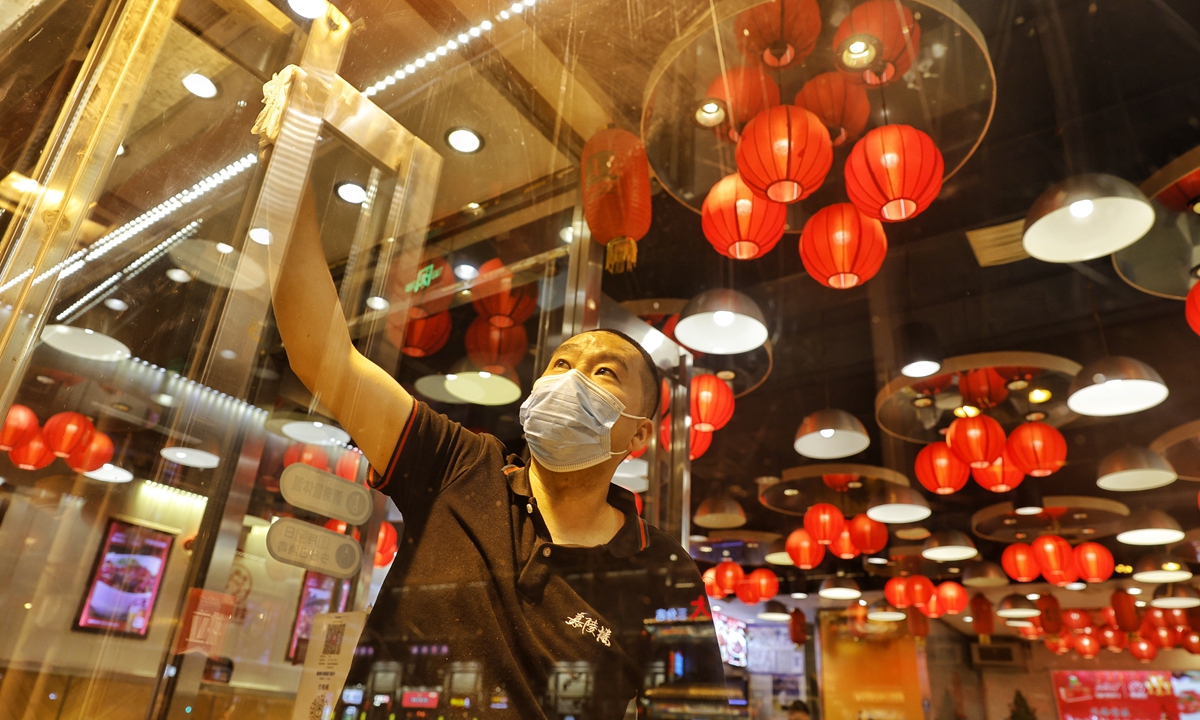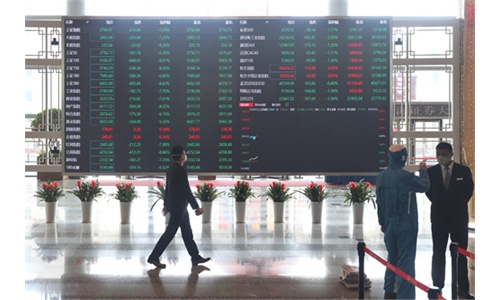
A restaurant staff member cleans a window on June 5, 2022 to prepare for the first group of dine-in customers after a hiatus of more than a month. Beijing will resume dine-in services for restaurants from June 6 after a COVID-19 resurgence was mostly curbed. Photo: Li Hao/GT
Streets and subways bustled with people, long queues were seen at restaurants, concert tickets were sold out in a few hours … Beijing resumed dine-in service in most restaurants, allowed public transport to return to pre-outbreak capacity and opened most public places on Monday as the capital city has not reported any infections outside quarantined areas for three consecutive days.
Since the moment the city announced plans to lift the ban on dine-in service on Sunday afternoon, Beijingers started to call on friends and families to have dinner parties after weeks of curbs on gatherings.
"I cannot wait to eat out even though today is a working day. I will have dinner with my family tonight … I feel like it's a victorious moment for Beijing's COVID-19 control and life has finally returned to normal," a resident surnamed Fan told the Global Times. "In the past month, I took my family for a 'street picnic' when restaurants were closed."
Lifting dine-in ban was a major step for Beijing, which had been facing the Omicron onslaught since April 22. Beijing partly opened malls and public venues in non-epidemic regions of the city a week ago.
"The number of newly confirmed cases in Beijing dropped to single digits yesterday, and the city has seen no new community cases for three days. The epidemic situation in Beijing has made initial achievements," said Xu Hejian, a spokesperson of the Beijing Municipal government, at Monday's press conference.
On Sunday night at about 11 pm, still an hour before the 24/7 Huda Restaurant, a popular snack hub for lobsters, was able to receive customers, people were lining up at the door.
Once the door opened, Huda was soon packed. "I expected to receive 50 tables of customers on Sunday night but the number exceeded our expectations, we had to call in waiters from other branches for help," an employee told the Global Times.
"In order to show appreciation to everyone's never-fading love and support, Annie's is launching a dine-in promotion for this awaited and delighted reunion!" Annie's, an Italian restaurant, is offering discounted menus over the next three days.
As commuters who previously worked at home returned to their usual work routines, the typical morning rush hour was seen on subway lines and traffic jams on the roads.
The stage of the National Center for the Performing Arts, which had been silent for some 40 days, became lively again on Monday. Tickets for a Beethoven-themed concert scheduled on Monday night sold out 12 hours after opening.
Beijing also announced plans to resume group tours, and put a cap of 75 percent visitor capacity in the city's parks.
Cinemas, libraries and gyms have also resumed service, with limits on the number of visitors.
Except for Fengtai and parts of Changping districts that still reported infections, business and normal life in most parts of the capital resumed, but some precautions remain.
"Beijing is still home to many high-risk and medium-risk regions. The risks of an epidemic resurgence cannot be dismissed as public life returns," said Xu.
People should remain on high alert for any flare-ups and Beijing will unswervingly carry out "dynamic zero-COVID" measures to defend its hard-won victory with a clear head, Xu said.
Before reopening, many restaurants conducted special epidemic-related training for their employees and encouraged customers to make orders on their phones so as to reduce people-to-people contacts, media reports said.
The Beijing Bureau of Commerce on Monday also stressed that wedding, birthday and group parties at restaurants are still not allowed. The city disease prevention and control center also encouraged restaurants to separate dining tables.
At a McDonald's branch in Chaoyang district, an employee told the Global Times that customers' visits will be restricted to around 70 percent during peak hours.
A negative nucleic acid test result is still needed to take buses and subway trains or enter public venues. The period of validity for the test has been increased to 72 hours from the previous 48 hours.

